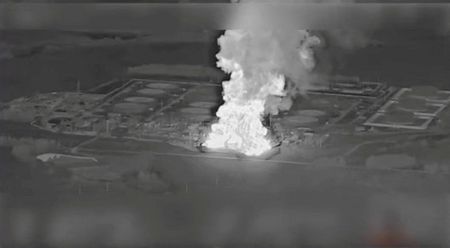By Anne Kauranen
HELSINKI (Reuters) -The captain of an oil tanker and two officers accused of severing five undersea power and telecoms cables in the Baltic Sea last December, blamed technical faults for the damage as their trial began in Helsinki on Monday.
NATO allies with forces stationed around the Baltic Sea went on high alert after the December 25 incident, one of a string of suspicious cable and gas pipeline outages in the region since Russia invaded Ukraine in February 2022.
Prosecutors say the Eagle S tanker deliberately dragged its 11,000 kg (24,250 lb) anchor along the seabed to sever the Estlink 2 power cable linking Finland and Estonia and four internet cables as the vessel sailed from a Russian port via the Gulf of Finland.
Finnish security forces intercepted the Cook Islands-registered ship and boarded it from helicopters after ordering it to move into Finnish territorial waters.
The tanker’s Georgian captain, Davit Vadatchkoria, and its Georgian first and Indian second officers pleaded not guilty, saying the vessel’s anchor had dropped due to technical faults in the securing of the anchor winch.
State prosecutor Heidi Nummela said that, while investigators did not find proof that the anchor’s fastening had been manipulated, the failure of all three available backstops was at minimum a sign of gross negligence on the crew’s part.
Finnish prosecutors are seeking 2.5 years in prison for aggravated criminal mischief and aggravated interference with telecommunications for the defendants who deny all charges and reject the cable owners’ claims for damages that amount to tens of millions of euros.
They also questioned the court’s jurisdiction in the matter, given the cable cuts occurred in international waters.
“This was a normal marine accident, not any sabotage,” second officer Santosh Kumar Chuarasia told reporters during a break.
He said that the anchor dropped due to bad weather and mechanical malfunction and that he trusted the court to rule in the defendants’ favour.
Vadatchkoria declined comment, while his lawyer Tommi Heinonen told the court the incident was “a marine accident”.
On December 25, the Eagle S sailed on for three hours at a reduced speed after severing the first power cable at 12:26 p.m. (1026 GMT), prosecutors told the court. When contacted by Finnish marine authorities at 3:20 p.m. and asked whether its anchor was up and secured, its crew replied in the affirmative, which was not true, prosecutors said.
Defence lawyers said the defendants had no reason to believe the anchor had sunk to the seabed as the tanker’s mechanical engineer, who is not on trial, had told them the drop in speed was caused by “an engine problem”.
Prosecutors said the tanker sailed on and cut four more cables between 6 p.m. and 7 p.m. that day, which they said showed clear criminal intent.
Last week, a Ukrainian was arrested over the 2022 attacks on the Nord Stream gas pipelines in the Baltic Sea. Both Moscow and the West have described the explosions, which largely severed Russian gas supplies to Europe, as sabotage.
($1 = 0.8619 euros)
(Reporting by Anne Kauranen; writing by Anna Ringstrom; editing by Hugh Lawson, Mark Heinrich and Tomasz Janowski)













